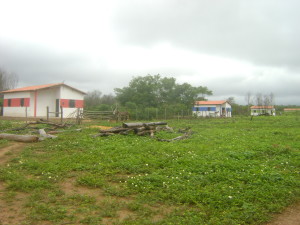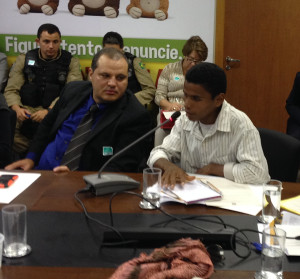One reason Brazil is a world leader in fighting modern slavery is the existence of the country’s National Commission for the Eradication of Slave Labor (Conatrae). The commission helps coordinate anti-trafficking efforts of governmental agencies, law enforcement, judges, prosecutors, businesses, international institutions and civil society groups.
The commission turned to the leader of our front-line partner organization CPT recently for a status report on his group’s new initiative to help people who’ve broken free from slavery.

The Nova Conquista settlement provides a new home for slavery survivors | Photo: Repórter Brasil
The project is called RAICE, and CPT activist Xavier Plassat explained to the commissioners how the program resettles slavery survivors onto land provided by the government and provides job training focused on local needs. This helps to prevent survivors from becoming trapped again by traffickers.
The RAICE project is based on a CPT award-winning initiative: the Nova Conquista settlement. It was organized in 2009 with CPT’s assistance after 15 people were rescued from agricultural and logging slavery. The settlement was awarded the National Award for Human Rights last year.

Chiquinho Oliveira briefs the Conatrae meeting | Photo: FTS/Modell
Slavery survivor Francisco “Chiquinho” Oliveira explained to commissioners that his family’s life has improved because of the resettlement project. Chiquinho has been able to attend college, and he’s been helping other families to create a community project to generate income for residents.
It was great to see that Chiquinho’s presentation was welcomed with warm applause, including from Brazil’s human rights minister, who presided over the Conatrae meeting.
The commission and our colleagues from Repórter Brasil also discussed current efforts to resume publication of the country’s “dirty list” of employers caught using slave labor. A court suspended publication of the list in December, pending judgement on a case involving businesses that have challenged the legality of publishing the information. A decision is expected this month on whether publication may resume based on Brazil’s Access to Information law.
Update Sept. 24.: No ruling yet from the court on resumption of “dirty list” publication. However, Repórter Brasil submitted a request based on the Freedom of Information Act, and was able to have access to a list from the Ministry of Labor containing 420 names of employers caught using slave labor in their supply chains during the period between 5/2013 and 5/2015. More information is available at the Repórter Brasil website.
Learn more about Free the Slaves in Brazil on our Brazil webpage. See our Brazilian front-line colleagues freeing slaves and exposing slavery in our minidocumentary: Partners in Action.
